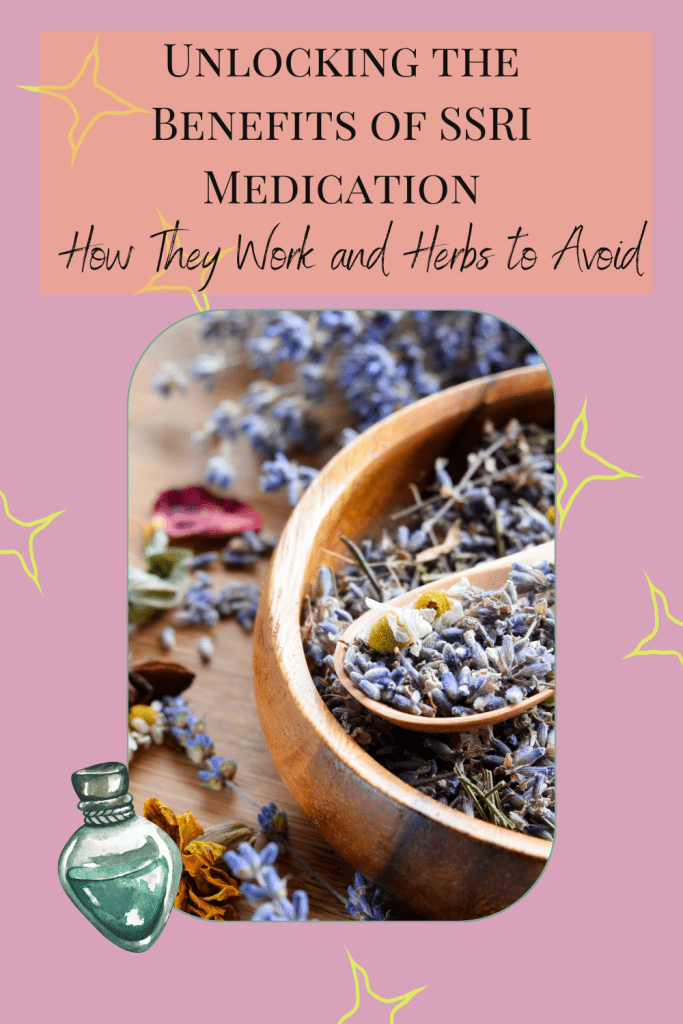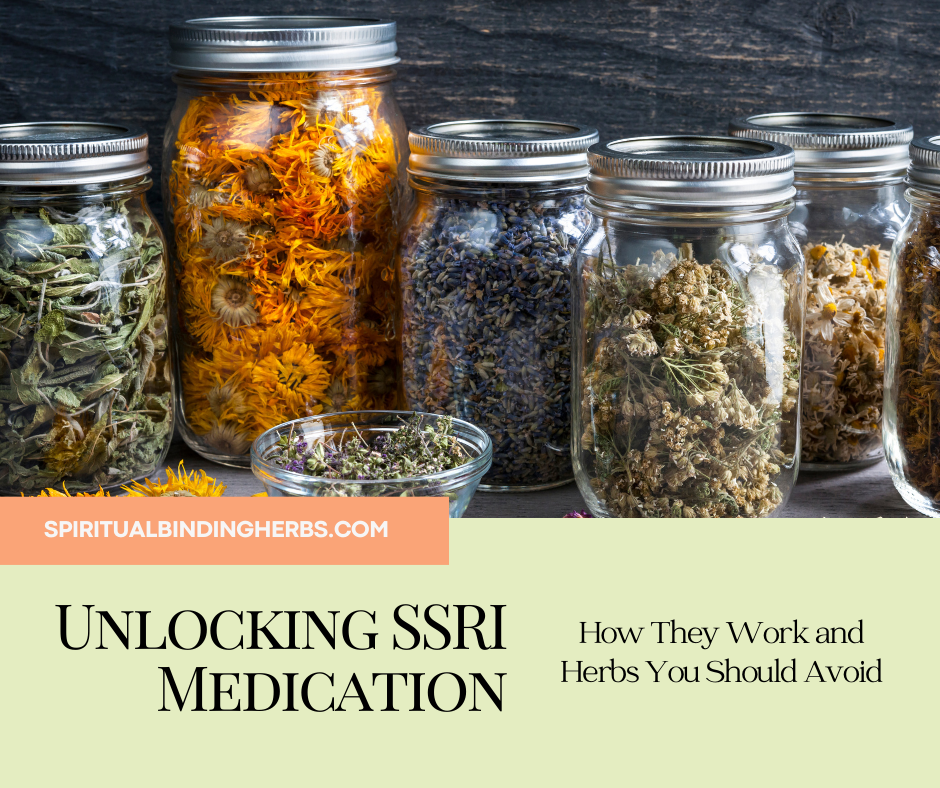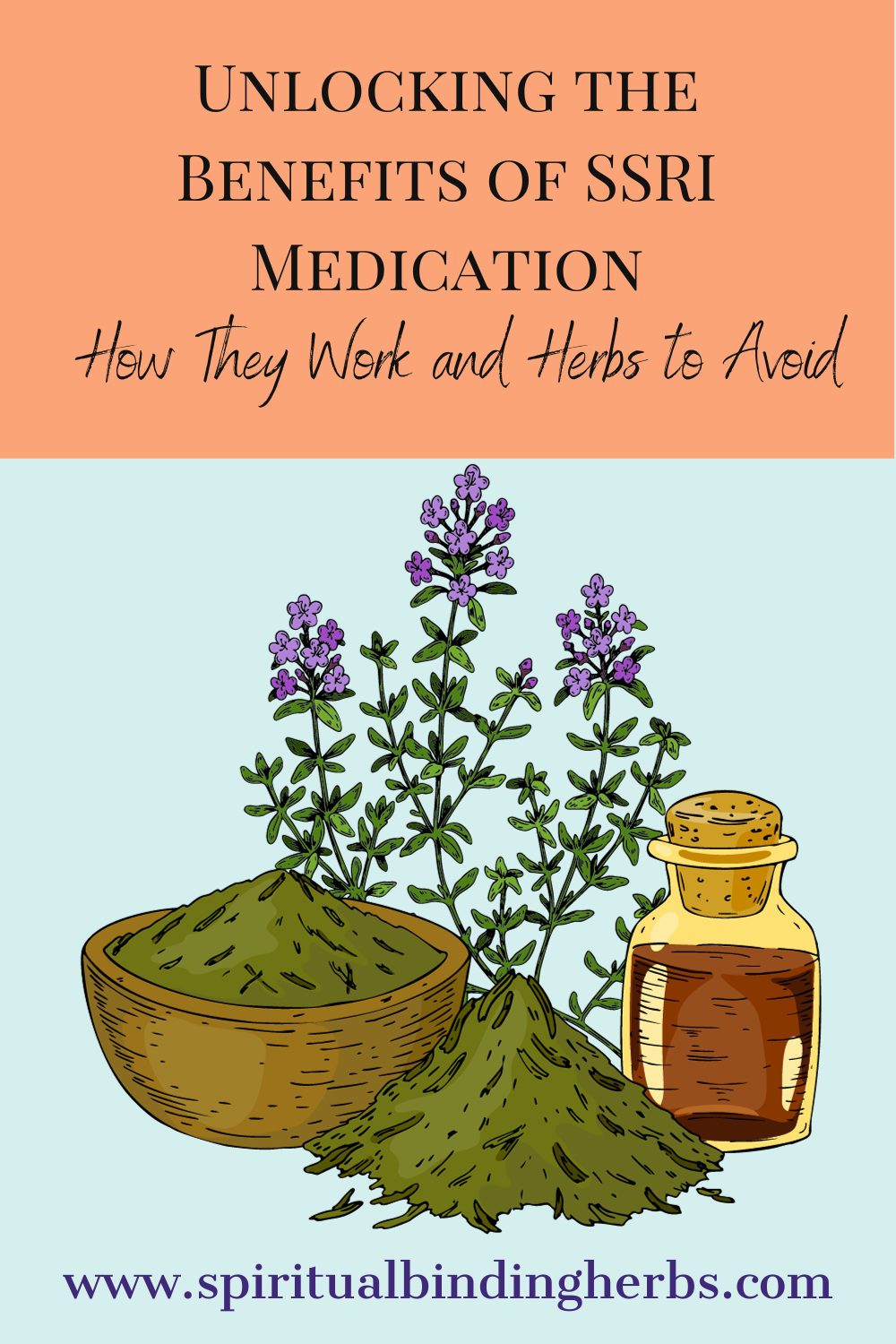
Unlocking SSRI Medication: How They Work and Herbs You Should Avoid
As you walk down the path of naturopathic medicine and herbalism, there is an innate nature to find natural alternatives to common over-the-counter (OTC) medications. Not only for yourself but also for the clients that you work with. It is important to know what certain herbs do and what synthetic medications do within the body. One common ailment that you may come across in your practice is those who are dealing with anxiety and/or depression, and these clients or yourself may have already been prescribed an SSRI medication.
So, what is SSRI medication and how does it work?
SSRI stands for Selective Serotonin Reuptake Inhibitor. It is a class of medications commonly used to treat various mental health disorders, primarily depression and anxiety disorders. SSRIs work by increasing the levels of serotonin, a neurotransmitter, in the brain. Serotonin is known to play a role in regulating mood, emotions, and behavior.
Here’s how SSRIs work:
- Serotonin Regulation: In the brain, neurons release serotonin and then reabsorb (reuptake) back into the same neurons. SSRIs inhibit the reuptake of serotonin, allowing more of this neurotransmitter to remain in the synaptic gap between neurons.
- Enhanced Mood: By increasing the levels of serotonin in the brain, SSRIs can help improve mood and alleviate symptoms of depression and anxiety. This is thought to be related to the regulation of emotions and mood.
- Gradual Effects: SSRIs typically do not provide immediate relief; they often take several weeks to reach their full therapeutic effect. It’s important for patients to continue taking the medication as prescribed, even if they don’t notice immediate improvements.
Common SSRIs include this list below. Listed with the generic brand first.
- Fluoxetine (Prozac)
- Sertraline (Zoloft)
- Paroxetine (Paxil)
- Escitalopram (Lexapro)
- Citalopram (Celexa)
These medications are generally considered safe and are widely prescribed, but they can have side effects, which may include nausea, insomnia, sexual dysfunction, and weight gain, among others. It’s essential for individuals considering or taking SSRIs to discuss potential side effects and any concerns with their healthcare provider.
SSRIs are just one class of medications used to treat depression and anxiety, and the choice of medication should be based on an individual’s specific symptoms, medical history, and response to treatment. It’s crucial for anyone considering or taking SSRIs to do so under the supervision and guidance of a qualified healthcare professional. Additionally, SSRIs should not be abruptly discontinued, as this can lead to withdrawal symptoms and any changes to medication should be discussed with a healthcare provider.

How Serotonin Regulation Work with SSRI medications
Let’s break down serotonin regulation with SSRIs in simple terms.
Imagine your brain as a control center for your feelings and emotions, kind of like a mood manager. One of the things it uses to control your mood is a chemical called serotonin. Think of serotonin as a happiness messenger in your brain.
Now, in a healthy brain, serotonin is released by special messengers (we call them neurons) to help you feel happy and balanced. After it does its job, some of that serotonin goes back into the neurons to be reused. It’s like recycling happiness.
But sometimes, in people who feel sad or anxious a lot, there might not be enough serotonin floating around in the brain. This can make them feel even sadder or more anxious than usual.
Here’s where SSRIs come in. SSRIs are like little traffic cops in your brain. They block the neurons from taking back too much serotonin. This means that more serotonin stays out in your brain, where it can keep sending its happy signals for longer.
So, SSRIs help boost the levels of serotonin in your brain. When there’s more serotonin around, it can help improve your mood and make you feel better. It’s like giving your mood manager a little extra help to keep you feeling happier and less anxious.
But it’s important to remember that these medications take some time to work, so you need to be patient and keep taking them as your doctor advises. Always talk to your doctor if you have any questions or concerns about your medication.
Now that we have a better idea of how SSRI medications work and we have broken down serotonin regulation it is time to mention one significant side effect of taking SSRI medication in tandem with certain herbs that also exhibit the same effects as SSRI medications. This is called serotonin syndrome.
Here you can find more information on SSRI medications.
Serotonin syndrome is like a traffic jam in your brain.
In your brain, there’s a chemical called serotonin that helps control your mood and feelings. It’s like a messenger that tells your brain how to feel happy and balanced.
But sometimes, too much serotonin can build up in your brain, like too many cars on a road causing a traffic jam. This can happen when you take certain medications, especially ones that affect serotonin, like antidepressants or migraine medicines.
When there’s too much serotonin in your brain, your brain gets confused, and it can cause a lot of problems. It’s like the traffic jam causing chaos on the road.
Symptoms of serotonin syndrome can include things like feeling really anxious, having a fast heart rate, sweating a lot, and even getting muscle shakes or feeling really restless. It can be quite uncomfortable and even dangerous if it’s severe.
As you can see too much serotonin can lead to an increase in anxiety symptoms. So, it is crucial that if you choose to work with herbs or an herbalist, you list all medications you are taking, how long you have been taking them, and the dosage of each. Many prescription drugs have gotten their blueprint from plants and taking certain herbs with certain medications can lead to too much of a good thing essentially.
The important thing to remember is that if you’re taking medications that affect serotonin, it’s essential to follow your doctor’s instructions carefully. They’ll make sure you’re on the right dose and not taking anything that can lead to this serotonin traffic jam. If you ever have unusual symptoms or feel really strange after starting a new medication, it’s crucial to let your doctor know right away, so they can make sure everything is okay.

What herbs should be avoided if you are taking SSRI medication
If you are taking SSRI (Selective Serotonin Reuptake Inhibitor) medication, it’s important to be cautious about using certain herbs and supplements because they can interact with SSRIs and potentially lead to adverse effects. Here are some herbs and supplements to be cautious about or avoid when taking SSRIs:
- St. John’s Wort: St. John’s Wort is an herbal supplement often used for mild to moderate depression. However, it can interfere with SSRIs and lead to a condition called serotonin syndrome, which can be very serious. It’s essential to avoid St. John’s Wort if you’re on SSRIs.
- 5-HTP (5-Hydroxytryptophan): This supplement is sometimes used for mood enhancement. It can increase serotonin levels, and when combined with SSRIs, it may lead to excessive serotonin in the brain. This can be harmful, so it’s best to avoid 5-HTP while taking SSRIs.
- SAM-e (S-Adenosyl Methionine): SAM-e is sometimes used to manage depression. It may also affect serotonin levels and should be used with caution alongside SSRIs. It’s crucial to consult with a healthcare professional before combining these two.
- Valerian: Valerian is an herb used for anxiety and sleep. It may increase the sedative effects of SSRIs, making you feel excessively drowsy or lethargic.
- Kava: Kava is another herb used for anxiety. Combining it with SSRIs can increase the risk of liver toxicity.
- Ginkgo Biloba: Ginkgo biloba is sometimes taken for memory and cognitive enhancement. There’s a potential for interactions with SSRIs, so consult your healthcare provider before using it together.
- Ginseng: Ginseng is often used for energy and mood support. Some types of ginseng may interact with SSRIs, so it’s best to consult your doctor before using them together.
It’s crucial to inform your healthcare provider about all the herbs, supplements, and medications you are taking to ensure there are no harmful interactions. They can provide guidance on what is safe and appropriate for your specific situation. Never stop taking prescription medications or make changes to your treatment plan without consulting your healthcare provider.
This is just a short list of herbs and if you are thinking of introducing any herbs into a daily regimen, please research and make sure there is no issues with the selected herb and any medication you or your client is already taking.
Information provided is for informational purposes only and is not intended to diagnose, prescribe, or replace the advice of professionals.
To learn more about anxiety and how it can manifest within the body, you can learn more about it in this article.
Wishing you love, light and inner peace babes ✌🌈✨💜
- Understanding the Different Types of Magnesium and Their Benefits
- How To Make Herbal Preparations: A Beginner’s Guide to Making Magical Herbal Remedies
- Exploring Herbalism: A Beginner’s Guide
- Unlocking SSRI Medication: How They Work and Herbs You Should Avoid
- Understanding Anxiety: Causes, Symptoms & Natural Relief Techniques






